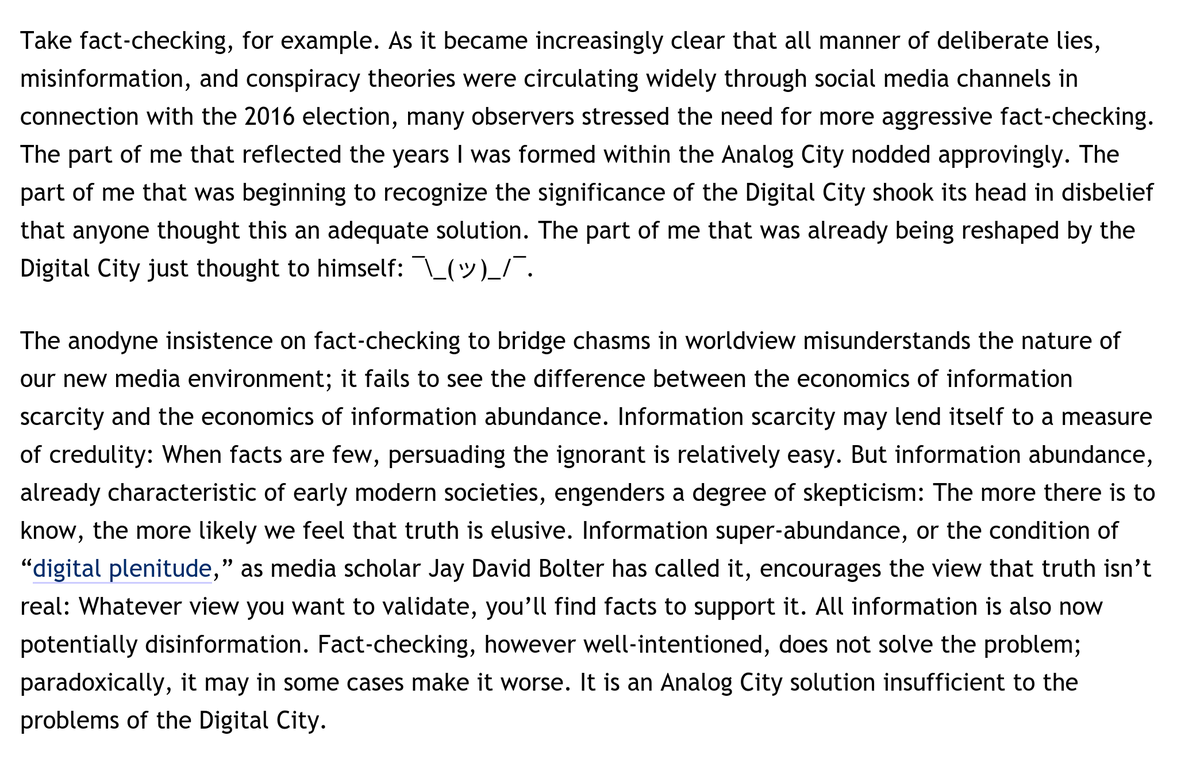corona & the politicization of everything has me pondering how my information diet has changed over the last ~decade, strategies for identifying & avoiding fake news
(thread)
(thread)
biggest one imo is: do you know the actual writer of the content in question. are you familiar with the journalist, poster etc, and do you trust them? what is their track record?
most people don't read bylines are completely oblivious to the human source of news
most people don't read bylines are completely oblivious to the human source of news
if you arent familiar with the poster, are you familiar with the person who shared the item? do you trust them and what is their track record?
are there multiple trusted people who are also liking, validating and sharing it?
are there multiple trusted people who are also liking, validating and sharing it?
next is the institutional source of content. this clearly provides information about its likely reliability, but for me the validation of specific trusted people is significantly more important
orgs like NYTimes get stuff wrong constantly, random bloggers are frequently the best
orgs like NYTimes get stuff wrong constantly, random bloggers are frequently the best
those are the big three discrete strategies, but more broadly you want to set up an information feed that allows for checking, criticism & error correction
if you're never seeing content that is later shown to be BS, your information feed is not robust enough. #umeshism
if you're never seeing content that is later shown to be BS, your information feed is not robust enough. #umeshism
this is probably a hard one for most people to grok, since it means actively cultivating a feed that produces lots of false positives & false negatives (of course those errors are still present in a normie information feed, just hidden; thus Fake News)
note: a live medium like television, which doesn't allow validation, sharing or appended edits, is inherently more suspect than an asynchronous multimedia feed
here the model can get more complicated. individual posters & validators aren't all trustworthy in a general sense. some are ideological hacks who nevertheless provide needed skepticism on certain topics
maybe you disregard their constant false-negatives (i.e. criticism of actually-reliable content) most of the time, but when they happen to get something right it is identified or shared by your other trusted validators
it's cliche to say "cultivate a diverse range of information sources" but fundamentally it is correct. the difficulty is that few people set up feeds that are *diversely different*
you need diversity across *multiple* dimensions: it's not enough to have just ideological, cultural, or expertise diversity if it's all within the same professional media organizational cluster
at the most abstract level you want to be Bayesian, in the non-technical LW sense
( https://www.lesswrong.com/posts/AN2cBr6xKWCB8dRQG/what-is-bayesianism;
https://slatestarcodex.com/2013/08/06/on-first-looking-into-chapmans-pop-bayesianism/)
throw weighted bits of evidence onto the pile, adjust degrees of confidence up & down, vs thinking in discrete categories of fake news/¬fake news
( https://www.lesswrong.com/posts/AN2cBr6xKWCB8dRQG/what-is-bayesianism;
https://slatestarcodex.com/2013/08/06/on-first-looking-into-chapmans-pop-bayesianism/)
throw weighted bits of evidence onto the pile, adjust degrees of confidence up & down, vs thinking in discrete categories of fake news/¬fake news
other than all of that, there's a whole universe of strategies & patterns related to what *kinds* of content tend towards fake news:
topics,
incentives ( https://meltingasphalt.com/crony-beliefs/ ),
identity signals ( https://voca.ro/h4hh2eSUf6W ),
etc
alright that's it for now //
topics,
incentives ( https://meltingasphalt.com/crony-beliefs/ ),
identity signals ( https://voca.ro/h4hh2eSUf6W ),
etc
alright that's it for now //
also worth mentioning: this is all highly related to Rao's concept of the emergent oracular brain, and how best to plug into it: https://twitter.com/vgr/status/1125119314611171328
adding this stratechery piece, which has an interesting analogy to computer networking & individual-based trust https://stratechery.com/2020/zero-trust-information/
going to start keeping track of good posts on this topic ---> https://twitter.com/mutual_ayyde/status/1245136816530841601
adding to this thread, great article about how digital media has reshaped our epistemic environment
https://www.thenewatlantis.com/publications/the-analog-city-and-the-digital-city
https://www.thenewatlantis.com/publications/the-analog-city-and-the-digital-city
another addition: good thread about the benefits of actively exploring & discussing kinda fringey or speculative news topics
it creates common-knowledge but most importantly, it's maybe the only real way to consistently stay ahead of the curve https://twitter.com/eigenrobot/status/1304270212997488640
it creates common-knowledge but most importantly, it's maybe the only real way to consistently stay ahead of the curve https://twitter.com/eigenrobot/status/1304270212997488640

 Read on Twitter
Read on Twitter


